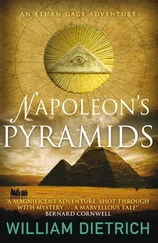William Dietrich - Dark Winter
Здесь есть возможность читать онлайн «William Dietrich - Dark Winter» весь текст электронной книги совершенно бесплатно (целиком полную версию без сокращений). В некоторых случаях можно слушать аудио, скачать через торрент в формате fb2 и присутствует краткое содержание. Жанр: Триллер, на английском языке. Описание произведения, (предисловие) а так же отзывы посетителей доступны на портале библиотеки ЛибКат.
- Название:Dark Winter
- Автор:
- Жанр:
- Год:неизвестен
- ISBN:нет данных
- Рейтинг книги:3 / 5. Голосов: 1
-
Избранное:Добавить в избранное
- Отзывы:
-
Ваша оценка:
- 60
- 1
- 2
- 3
- 4
- 5
Dark Winter: краткое содержание, описание и аннотация
Предлагаем к чтению аннотацию, описание, краткое содержание или предисловие (зависит от того, что написал сам автор книги «Dark Winter»). Если вы не нашли необходимую информацию о книге — напишите в комментариях, мы постараемся отыскать её.
Dark Winter — читать онлайн бесплатно полную книгу (весь текст) целиком
Ниже представлен текст книги, разбитый по страницам. Система сохранения места последней прочитанной страницы, позволяет с удобством читать онлайн бесплатно книгу «Dark Winter», без необходимости каждый раз заново искать на чём Вы остановились. Поставьте закладку, и сможете в любой момент перейти на страницу, на которой закончили чтение.
Интервал:
Закладка:
"Oddballs, you mean."
"Characters. Individuals."
"It wouldn't be worth being here if there weren't. Would it?" She held out the darts. "Your turn again."
"And why the Pole?" Lewis asked her, toeing up to the line.
"Because it's a powerful place. Where all lines converge. Point zero. You're on sacred ground, Jed Lewis."
"Sacred snow, isn't it?"
"Just give yourself the luxury of feeling."
Their medic, Nancy Hodge, came in and was cajoled into taking a turn. Her stance was firmer, legs apart, head cocked back rigidly, dead serious. She missed the board completely and everyone laughed.
"That's the way she gives shots!" Geller called.
Nancy pulled the errant dart out good-humoredly. "Watch what you say, George. My charts tell me you're due for a prostate exam."
"I'd rather get cancer."
Nancy lined up again, mouth pursed in concentration, and this time managed to hit the edge of the board. Dana radioed the scoreless result.
"Now we know why we won the America's Cup," the Kiwis radioed back, the comment buzzing with static.
"I guess athletics aren't Nurse Nancy's forte," Lewis observed.
"Not after teatime anyway," Geller murmured again. "If you need something checked, try to see her in the morning. She's steadier then."
"Booze?"
"Ah, I don't know. She's just not big on the hand-eye coordination thing, which ain't too cool if you need brain surgery."
"Our sole physician."
"You get the best and worst at the Pole. Missionaries and escapees. How many good doctors can walk away from their practices for a year? It's like the old naval surgeons. They all tend to have interesting stories. From the lines on her face, she looks like she's got more than one. My bet is she busted up with someone and came down here."
"To lick her wounds?"
"Or to find somebody else. This can be Lonelyhearts Club sometimes, goofily so. Hell, even somebody as ugly as me gets lucky sometimes."
"I don't know if I believe that one," Lewis said, playing straight man.
"It's true. The pilots brought in a crash dummy once and even he scored."
"But Nancy's not competent?"
"I didn't say that. She's smarter than any of us. We have a lot of fun with each other, kidding around. Just seems kind of rattled sometimes, like she's anxious to get rid of a patient. Like she's afraid of making a mistake."
The darts were fun and unworldly, performed to the background buzz of a radio linking them to a base across eight hundred miles of ice and snow. The Kiwis were intrigued by the new American mascot and Dana insisted the slug was doing gyrations every time the Yanks scored a point. Players drifted in and out, Lewis holding his own for a while. With the Americans down three matches to one, however, he excused himself and walked up a flight of stairs to the upstairs bar, the only place on station where alcohol could be consumed. It was the one nutrient they had to pay for.
Norse was there and Lewis joined him, nodding at the psychologist's beer and getting one of his own from the fridge, putting a mark on a tab for later accounting.
"Feeling better, I see," Norse observed.
"Just drinking after realizing what I got myself into."
"Miss your rocks already?"
"At least the ones ground into sand on a sunny beach."
Norse looked at Lewis with amusement. "It's interesting that they picked a geologist to do your job."
"I was available."
"That's their reason. What's yours?"
It sounded like a shrink question. "I trace it all to my mother."
"Ah." The psychologist nodded in defeat. "Okay. Confession some other time." He sipped his own beer. "I heard you met the estimable Doctor Moss."
"He granted me an audience."
"Interesting that you two got together so quickly."
Lewis wanted to deflect this line of questioning, too. "He's friends with my mentor, Jim Sparco. And it's fun to talk to God. He says we're all down here for Science."
"Well, that's the party line," Norse said. "We're the cannon fodder of the National Science Foundation, you know. They see us all as a means to an end: knowledge."
"And you don't?"
"I see knowledge as a means to us: as a way to develop as people. It's a subtle difference, but an important one. Are we here to save civilization or is it here to save us? Some historians see all of human history as the triumph of the group over the individual. But one of my questions is whether it isn't the extraordinary individual who defines the group. If the group's purpose isn't to make possible the occasional exceptional human being. The Einstein. The Jefferson. The Alexander."
"You're looking for Einstein at the Pole?"
"I'm looking for character. Integrity. Individuality. I sense some of that in you, Jed. You have a certain center of gravity. And then determining if that kind of person functions in a tight, almost claustrophobic society like the Pole. Is smothered by it. Transcends it."
"I'm just trying to keep my butt warm."
"Exactly."
Lewis smiled. Norse seemed more interested in who Jed really was than in helping him fit what the Pole wanted him to be. "Lots of individual characters here," he said, "and I like that. But it can be lonely being too individual."
"Thinking of someone in particular?"
"Well, I heard Buck Tyson's real name is Island."
"That doesn't mean he's lonely."
"He said at dinner that you two think alike."
Norse laughed. "Did he? Well. My belief is that no two people do think alike, contrary to popular belief. The Western god is rationality, and a communal kind of sanity: all of us agreeing on reality, and pulling along the same track. This social scientist is squishier, I'm afraid, theorizing that each of us is a prisoner of our own beliefs, fears, perceptions. That we live in different worlds. So to me the fundamental question is whether the kind of knowledge we gather in places like this leads to real sanity or some view of the universe that, in its very rationality, is truly insane. Does it lead to happiness? Well-being? Does it solve anything at all?"
Lewis considered. "Isn't knowledge worthwhile just for its own sake? Rod Cameron told me the purpose of life is learning. Aren't we all down here because we sort of believe that, in an unconscious way?"
"Do you believe that?" the psychologist asked.
"I don't know. It's nice to have a goal."
"Whose goal? Yours? Or the group's?"
"Both."
"No. Cameron just gave the goal to you."
Lewis was irked now. "What do you think we came down here for?"
"I don't know," the psychologist admitted. He sipped again. "That's what I'm down here to find out."
"Make a guess."
"I don't guess. I'm a trained professional." It was self-deprecating.
The psychologist had his own evasions, Lewis saw. "Not good enough," he persisted. "What's your reason, Doc?"
"Okay. I came down here to see if we should be here at all." The psychologist nodded, as if to confirm it to himself. "Do you know that America spends two hundred million dollars a year in Antarctica? Two hundred mil on the altar of knowledge! That's a goodly chunk of change. But what if rationality is a fraud? What if sanity- the idea everyone should think the same way, share the same reality- is a fraud? What if science is a fraud? That what pretends to explain everything in fact explains nothing to animals like ourselves, that NSF stands for a myth, that the druids and pagans and witches were right and that the true knowledge, the real insight, is in the dark wood- is in ourselves? What if the outermost veneer of civilization we represent is no thicker than the aluminum on this dome? What if at some point in our explorations we reach not revelation but utter mystery, a whole new pit of the indescribable, the unknowable?" He was looking at Lewis, his eyes bright. "What do we do then?" That intensity again.
Читать дальшеИнтервал:
Закладка:
Похожие книги на «Dark Winter»
Представляем Вашему вниманию похожие книги на «Dark Winter» списком для выбора. Мы отобрали схожую по названию и смыслу литературу в надежде предоставить читателям больше вариантов отыскать новые, интересные, ещё непрочитанные произведения.
Обсуждение, отзывы о книге «Dark Winter» и просто собственные мнения читателей. Оставьте ваши комментарии, напишите, что Вы думаете о произведении, его смысле или главных героях. Укажите что конкретно понравилось, а что нет, и почему Вы так считаете.












